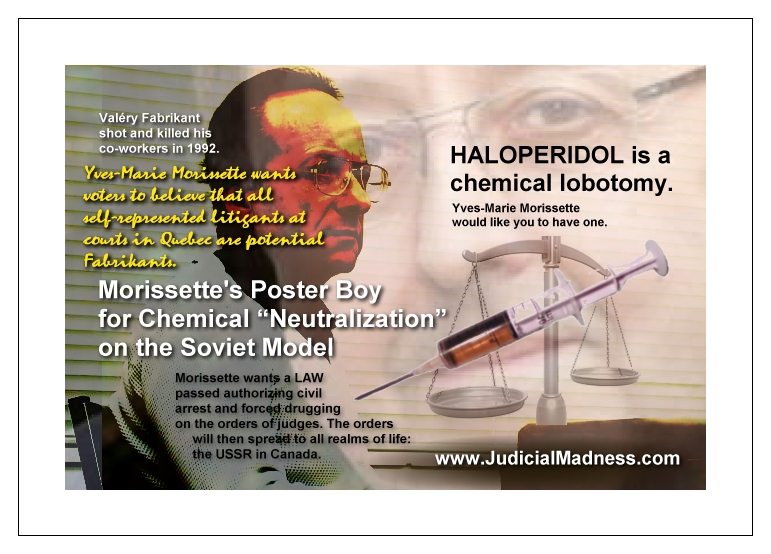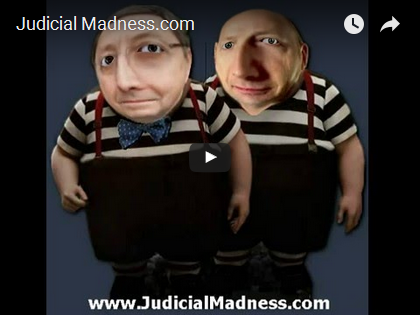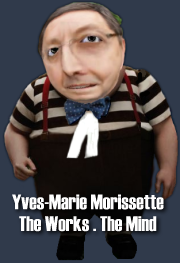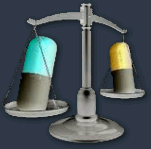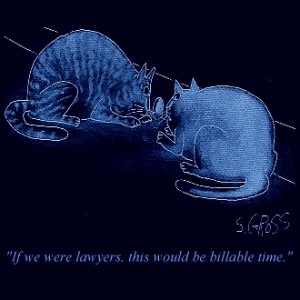Barreau du Québec c. Siminski (English) (1999)
WARNING
|
– Non-Official English Translation –
Barreau du Québec v. Siminski
12 May 1999, Superior Court
REJB 1999-12677 – Full Text
Superior Court (Civil Division)
C A N A D A
PROVINCE OF QUEBEC
DISTRICT of Montreal
No.: 500-05-046728-984
DATE: 12 May 1999
Barreau du Québec
Applicant
c.
Frank Siminski
Respondent
The Honorable Lyse Lemieux (Chief Justice of Superior Court of Quebec), Honorable Huguette St-Louis (Chief Justice of the Court of Quebec), Honorable Michèle Rivet (President of the Human Rights Tribunal), Honorable Jacques Biron (President of the Professions Tribunal) and Maître Louise-Hélène Sénécal (President of the Disciplinary Committee of the Quebec Bar Association)
Mis en cause
IN THE PRESENCE OF :
Paul Chaput, J.C.S.
Chaput J.C.S.:–
1 The Quebec Bar Association seeks an interlocutory injunction against Frank Siminski. It asks that he be ordered, with respect to disciplinary complaints against the Bar and its members inscribed on the [[[Tableau de l'Ordre]]], to follow the procedure provided in the Code of Professions1 and, as to any action or penal or civil procedure, to obtain the prior authorization of the Chief Justice of the Court in question or of a judge designated by the latter.
2 At hearing, F. Siminski filed a motion in annulment of the interlocutory injunction. It is in fact a contestation of the motion of the Bar.
Procedure
3 The motion was served on 14 December 1998, for presentation on the 21st next. On that day, the Court ratified the schedule of the parties and postponed the motion to 24 February 1999. That schedule reads as follows:
1. Deposition of the affiants in demand between 5 January and 15 January 1999, in light of the holidays;
2. Production of the defense affidavits by at latest February 2nd, 1999;
3. Deposition on these new affidavits and production of affidavits in counter-proof, if necessary, by 17 February 1999 at the latest;
4. File complete and pro-forma on 24 February 1999.
4 According to the file, there is no affidavit of Mr. Siminski, nor any oral examination on one side or the other.
5 On 23 March, there were presented before Judge D. Lévesque a motion to dismiss and a motion in extension of the delay to produce the defense. Judge Lévesque dismissed the motion to dismiss, and upon the oral request in recusation by Mr. Siminski, forwarded the motion for extension of delay to the Master of the Rolls.
6 On 16 April, Judge C. Larouche granted thirty days to produce the defense and scheduled the hearing of the motion for interlocutory injunction for 16 April. [sic]
The Evidence
7 In support of its motion, the Bar produced an affidavit of the Secretary of its Disciplinary Committee and Exhibits R-1 to R-36.
8 These Exhibits are copies of statements from the plumitif, complaints, pleadings, decisions, judgments, notices of appeal and of letters. These are public documents, except for two letters (Exhibits R-15 and R-16); there has been no objection as to the production of any of these documents.
9 As these Exhibits show, F. Siminski is the applicant, petitioner, complainant and appellant in a quasi-interminable suit of procedures, judicial or disciplinary, since 1981.
10 First, following judgment in his divorce file, he filed complaints before the Trustee of the Bar against his lawyer and instituted an action in damages against her. This action was dismissed for [[[ pour cause de péremption d'instance ]]]. Upon dismissal of the complaint against his lawyer, he sought revocation of the decision, which also was dismissed.
11 F. Siminski also filed complaints against the lawyer of his ex-spouse and instituted an action against her and the Bar. The Trustee of the Bar rejected the complaints, and the action was judged [[[ irrecevable ]]]. In Decembre 1995, he wrote to the Chief Justice of Canada to complain about the chicanery of the lawyers, and asked him [[[ Antonio Lamer ]]] to intervene.
12 In November 1995, he wrote a complaint, [[[ laissée en plan ]]], addressed to the U.N.O., to the Prime Ministers [sic] of Canada and of Quebec, and to the President of the Senate against sixty-four judges, commissioners and court clerks….
13 At the same time, in his file on a tax dispute, F. Siminski instituted an action in damages for $900,000 against fourteen lawyers occupying for the Ministry of Revenue, four lawyers mandated for him and the Bar. According to the plumitif (docket), this action is still pending….
14 For nearly a year, F. Siminski has taken legal or disciplinary recourses in matters that do not concern him.
15 In November 1997, he served a motion for a class actioon against the Bar and others. It is useful to cite the allegations:
1. The petitioners present this said motion for authorization to exercise a class action against the respondents and to add all the names of all the members of the Disciplinary Committee for the last 10 years who have demonstrated legal fraud and corruption;
2. In addition to adding all the lawyers of the Quebec Bar who refused and who refuse to respect their oaths of office and who hide behind their professional irresponsibilities [sic];
3. To add the name of Maître Daniel Jacoby as [[[ mis-en-cause ]]] for his declarations made on 8 March 1993 in the Journal de Montréal: «Ne plus laisser aux seules corporations la gestion de leur système de discipline» ["Do not allow the (professional) corporations to manage their own disciplinary system"].
4. The study conducted on the premises of the Quebec Bar by Frank Siminski, a de souche Quebec francophone, the son of Jeanne Audette, clearly demonstrates that the disciplinary system of the Quebec Bar is filled with legal fraud and corruption [[[ au vu et au su des ]]] the managers and with the approval of the managers of the Quebec Bar;
5. To add all the refusals that the Quebec Bar has refused to hear, and this for the last 10 years;
6. Which would produce in total no fewer than 5,000 cases, which is sufficient to exercise the said class action at the cost of the Quebec Bar, according to Article 2503 of the Civil Code of Quebec, that it is the Bar which is the professional insurer responsible for the costs of the poursuit as well as for the costs of the defense;7. The present motion is well founded in fact and in law;
8. It is in the interest of social justice and of the petitioners that the present motion to exercise a class action be accepted by one of the Honorable Judges of the Superior Court;
16 Following a motion to declare [[[ inhabiles ]]] the lawyers of the Bar for conflict of interest, and if the motion is not granted, the recusation of the judge seized.
17 Next, this is a motion for the forced withdrawal of the attorney for the Office of Professions and, in case of dismissal, the recusation of the judge seized. As well, F. Siminski demands the appointment of a foreign lawyer.
18 Next comes a motion (No. 500-05-036252-979) of F. Siminski and other applicants against the Bar, its Trustees, its Director General, against the President of its Disciplinary Committee and its Director of the Professional Liability Insurance Fund. Conclusions 2 to 10 of the motion read as follows:
ORDER the dismissal from their functions of the respondents, Maître Guy Lafrance, Maître Claude G. Leduc, Maître Christian Gauvin, Maître Pierre Gauthier, Maître Louise Comeau, Maître Jacques Fournier, Maître Bernard Faribault;
ORDER the respondents to be brought before the Criminal Court of Québec for their acts contrary to articles 22 and 23 of the Criminal Code of Quebec [sic] [[[ au su et vu de tous ]]];
ORDER the respondent Order of the Quebec Bar to resume all files of private complaints and or in the event of refusal, the dismissal of the Order of the Quebec Bar;
ORDER the total reimbursement of all costs incurred by the petitioners, and this from the outset;
CONDEMN the respondent Order of the Quebec Bar to compensate the applicants according to Articles 48 and 49 of the Quebec Charter of Rights and Freedoms of the Person and of Article 1619 of the Civil Code of Quebec;
ORDER the Office of Professions to continue the present motion at its cost as is its right in virtue of Article 3.1 of the Code of Professions in the names of all the applicants;
ANNUL the letters patent of the Order of the Quebec Bar;
ORDER a liquidator to proceed to the liquidation of the property of the Order of the Quebec Bar;
ORDER the dissolution of the Order of the Quebec Bar;
APPOINT a liquidator to proceed to the liquidation of the property of the Order of the Quebec Bar.
19 This motion was subsequently amended to add thereto as respondents the 282 members of the Disciplinary Committee of the Bar and its 30 associate trustees and to implead the Minister of Justice, the Chief Justice of Canada and the Lieutenant-Governor.
20 All these motions were dismissed on 8 December 1997. There was an appeal. Upon dismissal of the appeal, F. Siminski and others presented a motion in revocation and in correction for denial of justice, which also was dismissed on 25 May 1998.
21 In July 1998, F. Siminski files a complaint with the Disciplinary Committee of the Bar:
… in provisional radiation and suspension against Maître Ronald Cloutier, a lawyer for the trade union of Montreal civil servants, Maître Pierre-Yves Boisvert, a lawyer with the MUC legal department and a member of the Disciplinary Committee, Maître Jocelyne Langlais, a lawyer with the legal department of the MUC, Maître Pamela Larrea, a lawyer for the Association of Canadian bankers, Maître René Picotte, a lawyer with the CUM in 1992, Maître Jean St-Onge, Maître Sylvain Poitras, Maître Pierre-Olivier Boucher of the Human Rights Commission, Maître Madeleine Caron, director of the legal department of the Human Rights Commission in 1993, Maître Danielle Allard of the Justice Department, Maître Jocelyne Provost of the Justice Department, Maître Vincent Chiara, and implicating Maître Christian Gauvin, “responsible for advising” and the Office of Professions of Quebec.
22 He alleges that these lawyers are the authors of influence peddling, have carried out useless procedures and wasted over $1,000,000.00 in public funds.
Discussion
The appearance of right
23 In his motion to cancel the injunction, F. Siminski alleges that the injonction would violate his rights guaranteed by the Charter of Rights and Liberties 2 (“Charter“) and articles 1, 3, 6 and 7 of the Civil Code.
Art. 1 - 1. Every human being possesses juridical personality and has the full enjoyment of civil rights.
Art. 3 – Every person is the holder of personality rights, such as the right to life, the right to the inviolability and integrity of his person, and the right to the respect of his name, reputation and privacy.
These rights are inalienable.
Art. 6 – Every person is bound to exercise his civil rights in good faith.
Art. 7 – No right may be exercised with the intent of injuring another or in an excessive and unreasonable manner, and therefore contrary to the requirements of good faith.
Translator’s note: for convenience, these articles of the CCQ have been taken from the English CCQ of 1 December 2015.
24 It is Article 23 of the Charter which guarantees the exercise of legal rights.
Impartial hearing before independent tribunal.
23. Every person has a right to a full and equal, public and fair hearing by an independent and impartial tribunal, for the determination of his rights and obligations or of the merits of any charge brought against him.
Translator’s note: for convenience, Article 23 is taken from the Charter of 1 December 2006.
25 And, as seen at Article 56(1), the Charter comprises an expanded definition of the word “tribunal”.
1.(1) In sections 9, 23, 30, 31, 34 and 38, in Chapter III of Part II and in Part IV, the word “tribunal” includes a coroner, a fire investigation commissioner, an inquiry commission, and any person or agency exercising quasi judicial functions.
Translator’s note: for convenience, article 56 is taken from the Charter of 29 October 2008.
26 Also, Article 758 of the Code of Civil Procedure prohibits the injunction to prevent the exercise of legal rights.
758. An order of injunction can in no case be granted to restrain legal proceedings or the exercise of functions for a legal person established in the public interest or for a private interest, except in the case provided for in article 329 of the Civil Code.
Translator’s note: for convenience, article 758 is taken from the CCP of 1 December 2015.
27 Nevertheless, as envisaged by Article 7 C.C.Q., rights must always be exercised in accordance with the requirements of good faith.
28 According to the conclusions of his motion, the Bar does not seek to prevent F. Siminski from having access to the tribunals. It asks that the exercise of his legal rights be delineated and structured to assure that the requirements of good faith are respected.
29 Moreover, as Judge Cory writes in Canadian Council of Churches v. Canada (Minister of Employment and Immigration)3, it is also necessary to see to it that the functioning of the judicial apparatus is not sterilised by an abusive exercise of rights.
[Translation:] It is essential to establish a balance between access to the tribunals and the necessity of economising judicial resources. It would be disastrous if the tribunals became completely submerged due to a proliferation of non-essential or insignificant or redundant law suits instituted by well intentioned parties in the framework of achieving their objectives, convinced that their cause is quite important. It would be prejudicial, in fact overwhelming, for our justice system and unjust for everybody.
30 And, as envisaged by Article 46 C.p.c., it belongs to the tribunals to suppress such abuse:
The courts and judges have all the powers necessary for the exercise of their jurisdiction.
They may, at any time and in all matters, whether in first instance or in appeal, issue orders to safeguard the rights of the parties, for such time and on such conditions as they may determine. As well, they may, in the matters brought before them, even on their own initiative, issue injunctions or reprimands, suppress writings or declare them libelous, and make such orders as are appropriate to deal with cases for which no specific remedy is provided by law.
Translator’s note: for convenience, article 46 is taken from the CCP of 1 September 2015.
31 The tribunals have intervened in this sense at the request of laymen or professionals: De Niverville c. Descôteaux 4, Nguigain c. Commission de la fonction publique 5, Edward Yorke c. Mindy Paskell-Mede 6.
32 Again, as the interest of the Bar to act is not directly contested, it is advisable to note that its status as a professional corporation authorizes it to do so, with a view to protecting the interest of its members and of the public, in the sense in which Judge Montgomery writes in the case of La Chambre des huissiers du Québec c. Yves Lussier 7:
[Direct quote:] I would go somewhat farther than my colleague and hold that the appellant Chambre des Huissiers did have sufficient interest to make a motion under article 453 C.C.P. It is true that the said Appellant has no direct pecuniary interest, but it is not necessary to have such an interest; see in this connection our court’s decision in Howard c. Bergeron. If the interest be not pecuniary, it must be something more than the interest of the ordinary concerned citizen (see our recent decision in Jeunes Canadiens pour une civilisation chrétienne c. Fondation du Théâtre du Nouveau Monde), but the said Appellant was incorporated for the precise purpose, inter alia, of representing the collective interests of the bailiffs of this province, though it may be true that one can be a bailiff without being a member of the “Chambre”. It was surely the logical person to make a motion such as the present one.
33 It suffices to notice the great number of actions, motions and complaints instituted by F. Siminski to conclude as to disproportion. It is to be believed that he makes appeals to justice his full-time occupation. The multiplication of the recourses undertaken by him unduly monopolizes the judicial, administrative and disciplinary bodies. For this reason, the court must intervene to safeguard the integrity of the system.
34 On reading the declarations, motions or complaints instituted or filed by F. Siminski, in the past ten years he had been the victim of collusions, blackmail, treachery, machinations, chicaneries, threats and racism. A number of judgements have characterized these declarations, motions and complaints as frivolous, dilatory, or vexatious. Moreover, upon reading, one encounters vexatious, even defamatory statements. There is abuse to suppress in the interest of all parties concerned.
35 In the case of the recourses directed against the Bar and lawyers personally, as can particularly be seen from the conclusions of the motion in file No. 500-05-036252-979, Mr. Siminski, for all practical purposes, seeks to paralyse the Bar by his repeated interventions in files which do not concern him. Certainly, these files have a certain public character. But, to have the right to intervene, again, one must demonstrate a specific interest. The general allegation of corruption on the part of the lawyers does not suffice.
The prejudice
36 As explained by the Secretary of the Disciplinary Committee of the Bar in his affidavit, from the escalation of actions and recourses undertaken by F. Siminski for all intents and purposes there may result the asphyxiation of the disciplinary authorities of the Bar. When F. Siminski is the object of a decision that he does not like, whether it concerns him or third parties, he files complaints or actions in damages, which are nearly inevitably dismissed.
37 As the members of the disciplinary authorities of the Bar are acting as volunteers, one can understand the difficulty of the Bar in recruiting them. Lawyers are reticent to plead there, knowing that they probably will be the next respondents or defendants pursued by F. Siminski.
38 Concerning the role of lawyers in society, Judge Estey writes in Attorney General of Canada v. The Law Society off British Columbia and Victor McCallum 8:
[Translation:] From the point of view of the public interest in a free society, it is most important that the members of the Bar be independent, impartial and accessible and that the general public have, through their intermediary, access to advice and legal services in general.
39 The escalation of recourses undertaken by F. Siminski creates real prejudice for the Bar and its membes: it threatens the independence, impartiality and accessibility of lawyers with which Judge Estey is concerned.
40 The disciplinary authorities of the Bar are essential to maintain the quality of professional services that lawyers offer to the public. The functioning of these authorities must not be paralysed by exaggerated and baseless numbers of complaints, nor that their members be inclined, even forced, to refuse their aid due to the very real threat of complaints and law suits….
41 In oral argument, F. Siminski has but repeated his indictment of the corrupt practice for which the Bar and its members would be responsible. As for his motion to cancel the injunction, it is rather a contestation of the motion of the Bar. At any event, he still has a right of appeal.
For these Reasons, The Court:
42 GRANTS the motion for an interlocutory injunction;
43 ORDERS Frank Siminski, on pain of contempt of Court:
To not, directly or indirectly, file any complaint, grievance or disagreement concerning the Bar of Quebec and lawyers inscribed in the Table of the Order, with regard to their professional conduct, otherwise than by addressing himself to the trustee of the Bar of Quebec so that this complaint, this grievance or this disagreement be treated according to the procedure envisaged in articles 122, 122.1, 122.2, 123, 123.2, 123.3, 123.4 and 123.5 of the Code of the professions, to the exclusion of any other procedure.
To not, directly or indirectly, file an introductory legal procedure, whether it be civil, criminal, penal or administrative in nature, against the Bar of Quebec and the lawyers inscribed in its Table of the Order, or to subpoena them or otherwise call upon them to appear, without first having obtained the written assent of the Chief Justice or of the President of the tribunal concerned or of a judge or member designated by him;
Not to incite, advocate, help, advise, or cause whomsoever to file an introductory legal procedure of a civil, criminal, penal or administrative nature against the Bar of Quebec or lawyers inscribed in its Table of the Order, or to assign them to appear by way of subpoena or otherwise, without as a preliminary having obtained the written approval of the Chief Justice of the Court or the president of the Court concerned or of the judge or member designated by him;
44 ORDER that this injunction stand until final judgment;
45 EXEMPT the Bar from providing a guarantee [[[ de fournir caution ]]];
46 ORDER the service of the present ordonnance upon the respondent and the [[[ mis en cause ]]];
47 AUTHORIZE the service of the present ordonnance by registered mail to every other person and to every officer of justice responsible for a civil or administrative registry in Quebec;
48 AUTHORIZE service by way of posting in the registries of the court houses of Quebec;
49 DISMISS the motion of Frank Siminski in cancellation of the interlocutory injunction;
50 Without costs, on both motions.
Chaput J.S.C. [[[?]]]
Maître André Gauthier, for the Petitioner.
Mr. Frank Siminski, Respondent.
1. L.R.Q., c. C-26.
2. L.R.Q., c. C-12.
3. [1992] 1 R.C.S. 236, EYB 1992-67212, 252.
4. [1992] R.J.Q. 1049C.S..
5. [1996] R.J.Q. 3009, EYB 1996-85300 C.S.
6. [1996] R.J.Q. 1964 C.S.
7. [1984] C.A. 58, 60.
8. [1982] 2 R.C.S. 307, EYB 1982-149030, 336.
